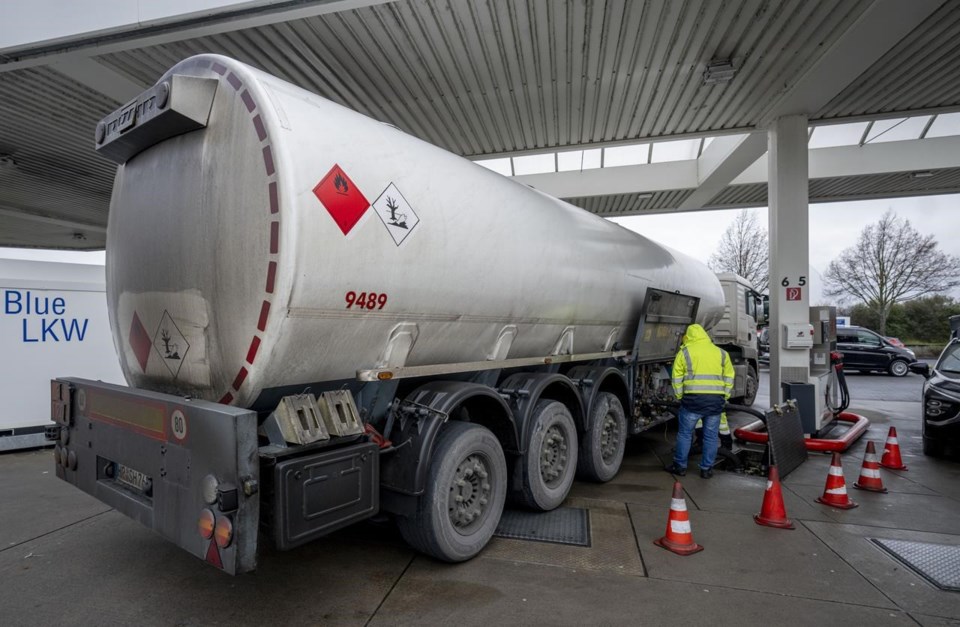CALGARY — When Russian tanks and troops rolled into Ukraine one year ago, it was no shock that crude prices spiked above US$100 per barrel for the first time since 2014.
With Russia controlling 10 per cent of the world's crude oil supply, many observers in the early days of the conflict predicted the war and Western sanctions against Russia could disrupt energy markets for years to come.
So it is surprising, 12 months later, that oil prices on the one-year anniversary of Russia's invasion of Ukraine are hovering around the US$75 per barrel mark again, very close to where they were before right before Vladimir Putin's run-up to war last winter.
"The consensus in March and April was that Russian production would slow by three million barrels per day, and that is the major thing that was flipped on its head," said Rory Johnston, Toronto-based energy analyst and founder of the Commodity Context Newspaper.Â
“Instead, we got an initial million-barrel-per-day loss of Russian production and then it bounced right back.”
In spite of Western sanctions, getting the world off of Russian oil has not proven to be easy. Global supplies were tight before the invasion, and Russia has found alternative markets — including China, Turkey and India — for its energy products.Â
It's unclear, one year into the ongoing conflict, whether Russia will be able to maintain its current production levels, especially as Chinese demand rebounds after the loosening of Covid-19 restrictions. But for now, the global oil market is relatively balanced, and the record oil prices seen in the first half of 2022 did not persisted.
That means the war in Ukraine hasn't been a game-changer for Canada's oil and gas sector. While the country did increase its output last year — Alberta set an annual record for oil and gas production, at 3.73 million barrels per day, according to ATB Financial — much of that increased production was incremental and had been planned by companies before Putin's invasion.
"Canada, in my opinion, didn’t do anything that we weren’t going to do anyway," said Richard Masson, executive fellow with the University of Calgary's School of Public Policy.Â
"So I don’t want us to be feeling too good about helping the world on this, because I don’t think we did.”
Canadian oil and gas companies benefited from high commodity prices earlier this year, in many cases posting record profits. But much of those profits went to paying down debt and rewarding shareholders rather than expanding or announcing new projects.
Masson said that's because in spite of all this year's talk about global energy security, Canada's oil and gas sector is still hamstrung by a lack of export infrastructure. The Trans Mountain pipeline expansion, which will bring much-needed oil export capacity, won't be finished until later this year, and LNG Canada — the country's first liquefied natural gas export terminal — won't be operational until approximately 2025.
Dulles Wang — a Calgary-based analyst for Wood Mackenzie — said while the war has brought issues of energy security and reliability to the forefront, it's the United States, not Canada, that has capitalized on it. Because the U.S. already had several LNG export terminals in operation, last year it was able to export more LNG than any other country in the world.
"The momentum for U.S. LNG contracts is probably the best indicator of the past year's focus on energy reliability," Wang said.
"The U.S. has definitely benefited quite a bit."
At the end of the day, Masson said, the war in Ukraine hasn't changed the fact there is an inherent conflict between global demand for increased oil output and Canada's climate commitments. That creates investment uncertainty and makes companies reluctant to dramatically increase capital expenditures.
“We want to move toward net-zero emissions and green energy and all these things. Well, if we move at a pace many people are advocating for, that says to companies, 'don’t get spending a bunch of money on new projects,'" Masson said.
"In my opinion, we are underinvesting in the energy supply the world needs, but there's no incentive for companies to do it."
This report by The Canadian Press was first published Feb. 24, 2023.
Amanda Stephenson, The Canadian Press




